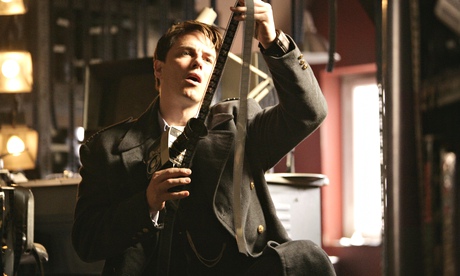
There's a tart cross-media irony to the death of BBC3 by digital transition. Here – outraged, protesting – stands a crowd of cool comedians, producers, dynamic executives, cutting-edge analysts: just the kind of people who tell you that print newspapers are dying because today's youth is swarming online. But when Tony Hall (63) takes the advice of David Dimbleby (75) and boots the young audience of Three into cyberspace, all we hear is a wail of woe. Visions of the future arrive stuck in the past.
Which is, of course, the wider problem for Hall as he attempts to grapple with the tests of charter renewal, licence fee survival, and the need to cut and cut again at budgets increasingly weighed down by pension fund deficits. He's made, at first glance, a sensible enough move. BBC3 costs around £85m in programme terms (a juicier target than BBC4's £67m). It's the natural first channel to shovel online, seemingly prime material for the iPlaying tablet generation. And since he wants some of the £100m he thinks he must save to go to boosting BBC digital investment as well as mainstream drama and an extra hour of kids' shows, there's a symmetry here.
Will his masters – the BBC Trust – go along with it? Wait a few months, through the grinding inevitability of viewer value testing, to find out. But if they don't like it, they'll be asked to find an alternative bag of sausage to dismember. And meanwhile the inevitable fuss may make politicians – or at least those stuck with charter negotiations after the election – think hard about incurring the wrath of those the BBC can't afford to please any longer.
No immediate harm done, then. But step back, look at the bigger picture, and dilemmas start swirling. For the disappearance of Three sends a bleaker subliminal message. It means that the old Birtian philosophy of embracing every facet of multichannel life, of securing everlasting licence fee renewal by offering something to every fee-payer, is now formally defunct. In broadcasting terms, this is the start of the long march back from Moscow, down a rutted track full of hard choices. Next chop: BBC4? "More" isn't the answer any longer. So what is?
If henceforth Three is a "new and innovative online service", does it just sit there, year after year, a shrunken £25m remnant of the early Freeview era? Of course not. The BBC still invests hugely in its website (spending far more than any of its newspaper rivals). Its supposed ambition to surf the waves of change never wanes. So a digital channel marked Three can't just be a dying fall, a glib excuse for saving money and defusing complaint. It must also be the start of something big.
BBC3, over time, will have to be a success in its own terms, a channel in your broadband living room as well as on your smartphone, to be watched alongside more standard fare on the same or adjacent screens. And what sense does a traditional "British Broadcasting Corporation" make then?
At the most basic level, a total digital service free from advertising incursions doesn't fit. For good or ill, marketing messages and online entertainment are brothers under the skin. The logic of digital pulls them together. And if that – the Mark Zuckerberg memorial lecture – is true, who can suppose that the licence fee, and taking people to court over £145.50, can in any way be fast forward?
But it doesn't need to happen now, say the traditional lobby of corporation admirers (in evidence last week at a Media Society meeting to launch the book Is the BBC in Crisis?). There are questions of governance structures to solve, of course. There are charter permutations about "Independence" to worry over if the wrong party with the wrong pledges wins in 2015. But there is no consuming crisis, because most things can just potter along.
Curiously, though, that's exactly what the latest twist in the road starts to rule out. Conventional television – for all its licence fee or advertising power – isn't paddling a different canoe from the Rothermeres, Murdochs and Pearsons of print. It is caught on the cusp of change too. The BBC thinks it must be a huge digital player, both technically and creatively. It is now putting whole channels online. But Hall wants to shore up the revolution by, for instance, charging a licence fee for iPlayer use – just one more subscription to sit alongside Netflix and the rest. He's started. Where will he stop?
Old logic; new logic. We don't know whether the Three decision is a blast from yesteryear or a march down the road. We're supposed to be comforted that whatever is lost can still be seen late at night when everyone else is in bed. We're asked to believe that the likes of Gavin and Stacey would never have made it into One world without the segmented environment called Three. We are never allowed to cast off musty assumptions and think afresh.
In short – like newspaper managements elsewhere in that thick forest – Hall has started making tough, necessary choices at last: but we don't know when or where he'll finish.

